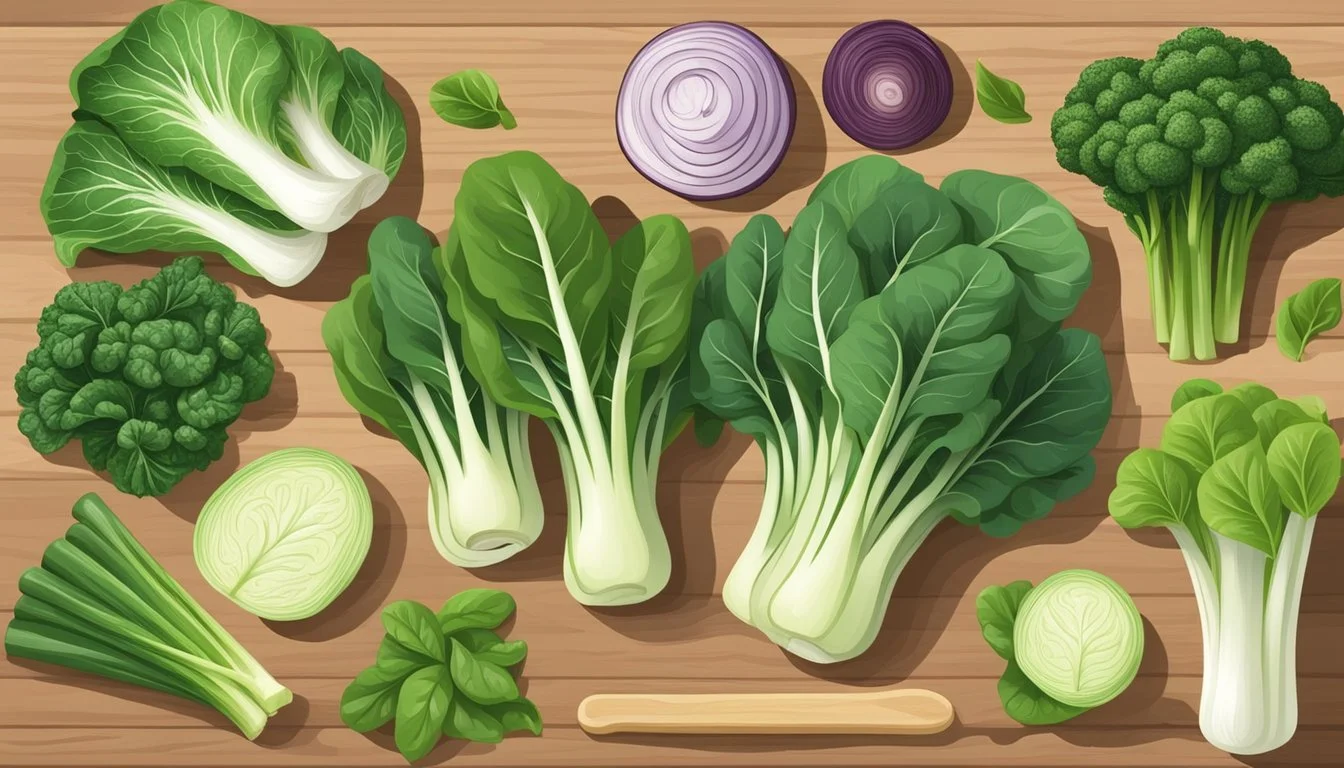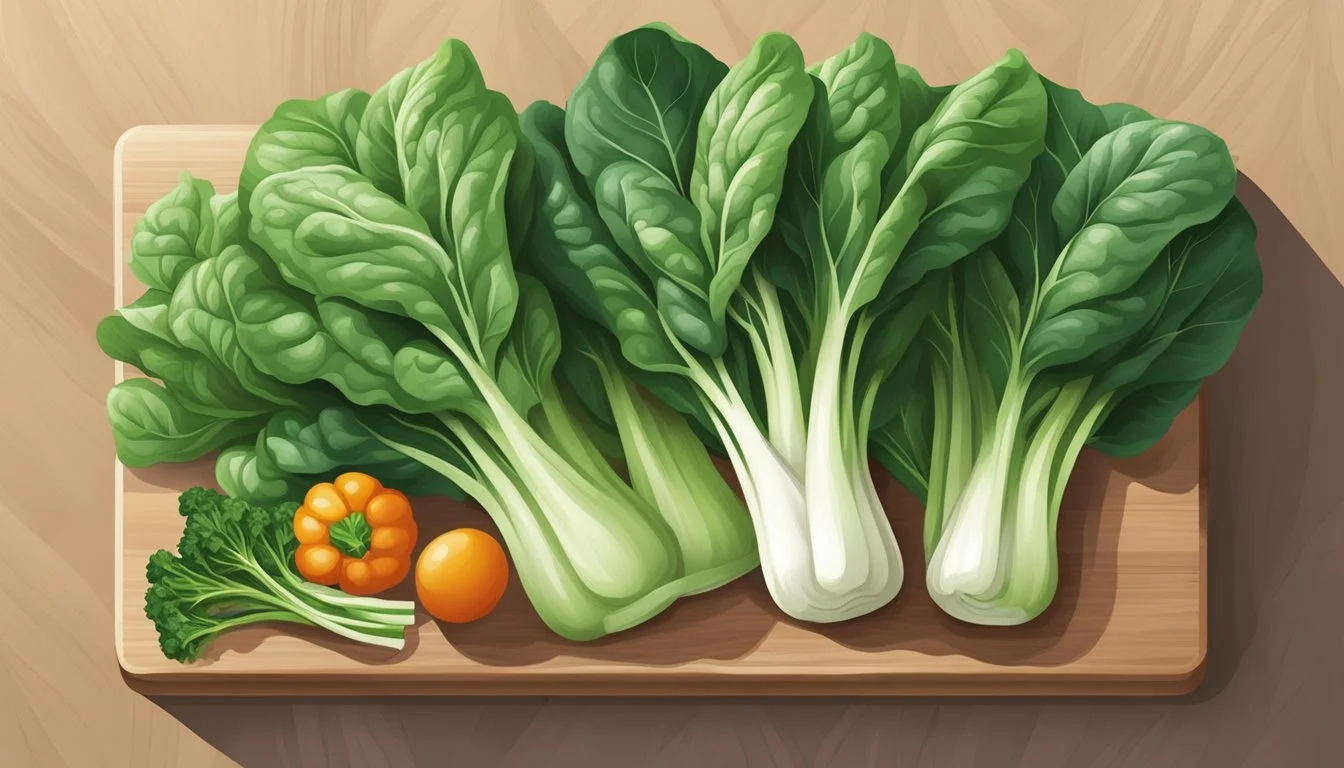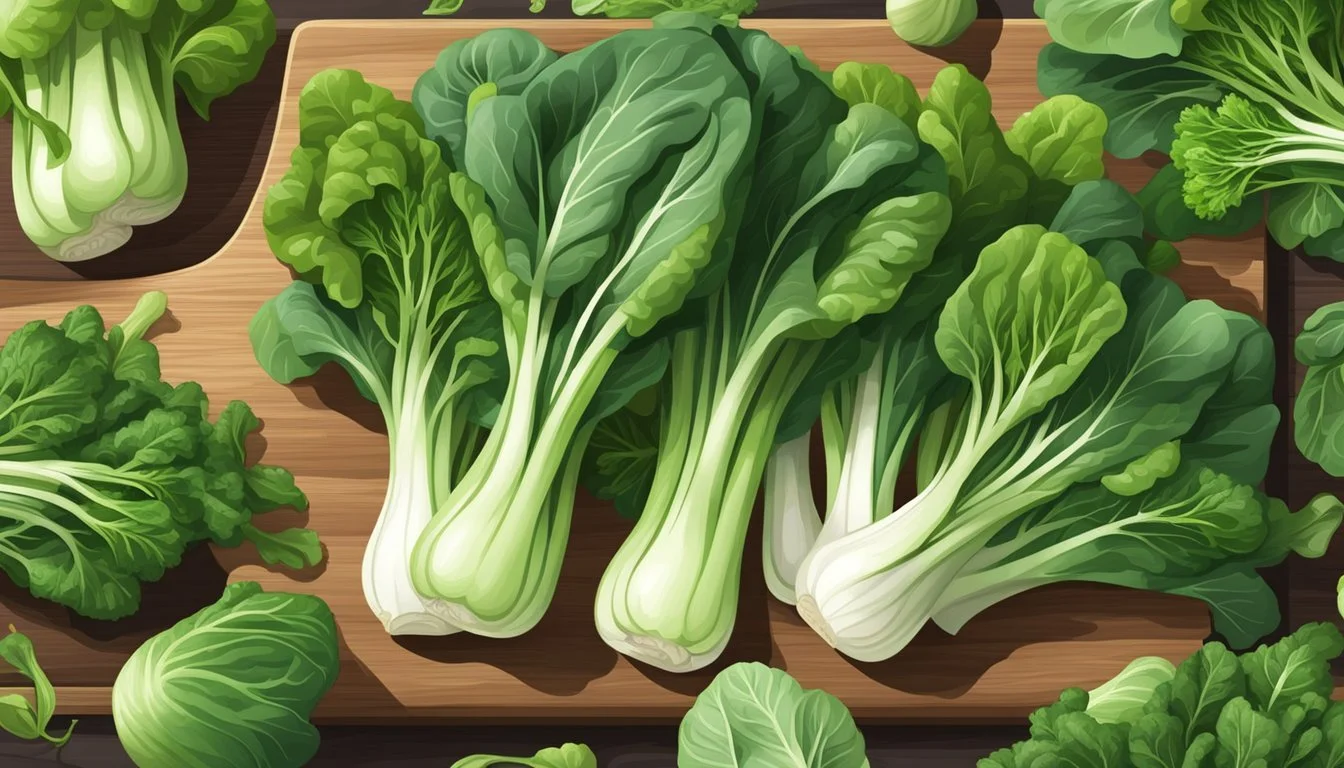Baby Bok Choy Substitutes
Top Alternatives for Your Recipes
When you're out of baby bok choy but still want to prepare that perfect dish, knowing the best substitutes can save the day. Napa cabbage is an excellent alternative due to its similar texture and mild flavor. This makes it ideal for stir-fries, soups, and other recipes that usually call for baby bok choy.
Yu choy also stands out as a versatile substitute. With a flavor profile that bridges between bok choy and Chinese celery, it fits seamlessly into many dishes. If you're looking for something more readily available, celery offers a suitable crunch and nutritional benefits, although its flavor is more pronounced.
Pea shoots from sugar snap peas can add a delightful crispness to your meals, closely mimicking the texture of baby bok choy when used raw. They make a fantastic addition to soups and Asian-inspired recipes, providing both freshness and visual appeal.
Understanding Bok Choy
Bok choy, a staple in many Asian cuisines, is known for its distinctive flavor and nutritional benefits. This leafy green vegetable combines the crisp texture of its white stalks with the tender, slightly bitter taste of its dark green leaves.
Nutritional Profile
Bok choy is packed with essential nutrients and vitamins. It is a rich source of vitamins A, C, and K, which are crucial for vision, immune function, and blood clotting, respectively. Additionally, this vegetable provides calcium and iron, vital for bone health and red blood cell production. Potassium in bok choy helps maintain proper heart and muscle function. High in fiber yet low in calories, bok choy supports digestive health and aids in weight management. Its high antioxidant content also fights oxidative stress, providing overall health benefits.
Culinary Uses
Bok choy is versatile in the kitchen, frequently featured in Asian dishes. Its white stalks and dark green leaves can be used in various recipes including stir-fries, soups, and salads. The stalks maintain a satisfying crunch even when cooked, while the leaves soften and absorb flavors well. Steaming, boiling, and sautéing bok choy brings out its subtle, slightly bitter taste. It can also be used raw in salads for a refreshing, crisp texture. This vegetable pairs well with garlic, ginger, and soy sauce, making it a popular choice in Asian cuisines.
Distinctive Characteristics
Bok choy is easily identifiable by its dark green leaves and contrasting white stalks. The leaves are tender and mildly bitter, providing a unique flavor profile. The stalks are crunchy and juicy, offering a pleasant texture contrast. This combination makes bok choy distinct among leafy greens. It's available in different sizes, from baby bok choy, which is sweeter and more tender, to the larger, more mature plants. Both types provide the same nutritional benefits and can be used interchangeably in recipes, depending on the desired texture and flavor.
Choosing Substitutes for Baby Bok Choy
When opting for a substitute for baby bok choy, it's crucial to consider the flavor profile, textural qualities, and nutritional value of potential alternatives. Matching these aspects can help maintain the integrity of your recipes.
Flavor Compatibility
Bok choy's mild flavor makes it an adaptable ingredient in various dishes. Napa cabbage is a fitting alternative due to its similarly subtle taste, which gains sweetness upon cooking. Swiss chard presents another option, though its flavor is slightly more bitter. Spinach can also be used, bringing a more pronounced but complementary taste. Selecting a substitute with a similar flavor profile ensures the dish remains balanced and enjoyable.
Textural Considerations
Baby bok choy has tender leaves and crunchy stalks, making texture a key factor in choosing a substitute. Napa cabbage offers a similar balance of leafiness and crunch. Swiss chard's stems can mimic this texture well when chopped into appropriate sizes. Alternatively, celery and young kale can provide the required crunch and tenderness. Maintaining the right texture is essential to preserving the dish's intended mouthfeel and culinary experience.
Nutritional Equivalence
Baby bok choy is packed with essential nutrients, including vitamins A, C, and K. When seeking substitutes, it's important to consider their health benefits. Swiss chard and spinach are rich in similar vitamins and minerals, making them suitable nutritional replacements. Napa cabbage also offers a good nutrient profile, though in slightly different proportions. Ensuring the substitute provides comparable nutrition helps maintain the health benefits of the original ingredient.
Vegetable Substitutes Overview
Identifying alternatives to baby bok choy can help maintain variety and nutrition in recipes. Two categories of substitutes include leafy greens and cruciferous vegetables that can closely mimic the texture and flavor of baby bok choy.
Leafy Greens as Alternatives
Leafy greens like spinach, Swiss chard, and kale are excellent substitutes for baby bok choy. Spinach has tender leaves and a milder flavor, making it suitable for soups and stir-fries. Swiss chard offers a slightly bitter taste with a crunchy texture similar to bok choy stems. Kale, with its robust and earthy flavor, works well in hearty dishes.
Mustard greens and collard greens are also viable options. Mustard greens bring a peppery undertone, adding a unique twist to dishes. Collard greens are sturdy and can be used in longer-cooking recipes, providing a chewy texture. These substitutes can be used in a 1:1 ratio in most recipes that call for baby bok choy.
Cruciferous Vegetables Match
Cruciferous vegetables like napa cabbage and Chinese cabbage are well-suited to replace baby bok choy. Napa cabbage, widely recognized for its soft leaves and mild flavor, closely resembles bok choy in both taste and texture. It’s particularly good in dishes requiring quick cooking. Chinese cabbage, also known as pak choi, offers a similar structure with its tender leaves and crunchy stems.
Gai lan (Chinese broccoli) and choy sum are also popular Asian greens. Gai lan has a slightly bitter taste and thick stalks, making it great for stir-fries. Choy sum, with its sweet and tender leaves, is another excellent choice. Both can effectively mimic the culinary characteristics of baby bok choy, enhancing the dish’s flavor and texture.
Top Recommended Substitutes
When substituting baby bok choy in recipes, the best alternatives replicate its flavor, texture, and culinary versatility. The recommendations here will guide you through appropriate substitutes for various cooking methods and dishes.
Best Overall Substitute for Baby Bok Choy
Napa cabbage stands out as the best overall substitute for baby bok choy. Originating from the same region, Napa cabbage shares a similar crunch and mild flavor. It's versatile enough to be used in stir-fries, soups, and salads.
Napa cabbage has long, green leaves and a fibrous texture ideal for most recipes that call for baby bok choy. When cooked, it also turns softer and slightly sweeter, making it a nearly identical substitute.
Best Substitute in Soups
When looking for a substitute in soups, Swiss chard is an excellent choice. Its tender leaves imitate the texture of baby bok choy, while the slightly bitter flavor adds complexity to the soup. Swiss chard's hearty stems provide a satisfying crunch, maintaining their structure when cooked in broth.
Swiss chard is readily available and provides essential nutrients, making it a healthy addition to soup recipes. Use it in the same quantity as baby bok choy to ensure balanced flavor and texture.
Best Substitute for Fresh Salads
For fresh salads, watercress is a top substitute. While it doesn’t match the crunchy texture, watercress brings a peppery, vibrant flavor to your dishes. It's particularly good in salads, garnishes for soups, and as a fresh element in spring rolls.
The nutritional benefits of watercress include vitamins A and C, iron, and calcium. Incorporating watercress not only adds a zesty, crisp element to fresh salads but also boosts their nutritional value.
Preparation and Cooking Tips for Substitutes
Preparing substitutes for baby bok choy requires understanding their unique characteristics to maximize flavor and texture in various dishes. Whether stir-fried, steamed, or eaten raw, each substitute offers its unique benefits and challenges.
Substitutes in Stir-Fries
Napa cabbage and Swiss chard are excellent substitutes when stir-frying. Napa cabbage has a mild flavor and gets sweeter as it cooks. When using napa cabbage, chop it into bite-sized pieces. Heat oil in a pan, add garlic, onions, and spices like coriander, then toss in the napa cabbage and cook until tender but still crisp.
Swiss chard also works well. Its tender leaves cook quickly, retaining a slightly bitter taste. Slice the leaves and stems separately, adding the stems first to the hot pan with garlic and spices. Cook for a few minutes before adding the leaves. Cook until just wilted to maintain texture.
Substitutes in Steamed Dishes
Pea shoots and napa cabbage are great for steaming. Pea shoots have a delicate flavor and can be steamed whole. Place them in a steamer basket over boiling water for about 3-4 minutes. They pair well with soy sauce or oyster sauce as a light side dish.
Napa cabbage, on the other hand, should be sliced into larger chunks. Steam for 5-7 minutes until tender. Serve with a drizzle of oyster sauce and a sprinkle of fresh spices or coriander to enhance the flavor.
Substitutes in Raw Eating
For raw dishes, watercress and pea shoots are excellent choices. Watercress has a peppery taste, making it perfect for salads or garnishes. Wash thoroughly and chop into bite-sized pieces for salads. It pairs well with fresh spices, onions, and a light vinaigrette.
Pea shoots, with their mild taste and crunchy texture, are ideal for salads and smoothies. Rinse them well and use whole or chopped in salads. Add to smoothies for a nutrient boost without altering the flavor much. Combine with fresh coriander or mixed greens for a refreshing salad.
Shopping and Storage
When looking for baby bok choy substitutes, it's crucial to select the freshest ingredients and store them properly to maintain their quality until use.
Selecting the Freshest Substitutes
When shopping at the grocery store for baby bok choy substitutes, consider vegetables such as Napa cabbage, kale, and Swiss chard. Look for bright, vibrant leaves without any signs of wilting or yellowing. The stems should be firm and crisp.
Gently squeeze the vegetables. Fresh options will be firm and resistant to pressure. Avoid any with slimy spots or brown edges, as these indicate spoilage. Always check the sell-by date where applicable.
Storing Vegetables for Optimal Freshness
Once home, proper storage is pivotal to maintaining the crispiness of your vegetables. For most leafy greens like kale and Swiss chard, wrap them in a damp paper towel to retain moisture. Place them in a perforated plastic bag before storing them in the fridge.
Napa cabbage can be stored in the crisper drawer of the fridge to keep it fresh longer. Keep the fridge temperature between 32-40°F to extend the shelf life of these vegetables.
For Napa cabbage, make sure it's dry before storing to prevent wilting and decay. If any leaves become soft or slimy, remove them to keep the rest fresh.
Beyond the Substitute: Enhancing Your Meals
Incorporating varieties of bok choy alternatives can not only replicate the original texture and flavor but also add unique twists to traditional and creative dishes. Here, the use of substitutes is explored in both traditional Asian cuisine and inventive recipes to elevate your meals.
Usage in Asian Cuisine
Asian cuisine, particularly Chinese dishes, often features bok choy for its mild flavor and crisp texture. Napa cabbage, a popular substitute, mimics these qualities with its crunch and slight sweetness, especially when cooked. It's a staple in dishes like stir-fries and kimchi.
Spinach can also replace baby bok choy in soups and side dishes. Its softer, fibrous stems provide a slightly different texture but are highly nutritious. Swiss chard is another alternative, particularly fitting in hearty recipes due to its thicker stems and robust flavors. Including these substitutes in your Asian dishes ensures that the overall essence and health benefits are preserved.
Creative Recipe Ideas
Utilizing bok choy substitutes can inspire creativity in your cooking. Swiss chard sautéed with garlic makes a flavorful side dish. Napa cabbage can be used in spring rolls and dumplings, benefiting from its firm, crunchy stems.
Watercress adds a peppery bite to salads or as a garnish for soups, contrasting with the milder bok choy. Spinach pairs well in various stir fries and as a leafy green vegetable in sandwich wraps.
Experimenting with these ingredients allows for an expanded culinary repertoire, offering new textures and flavors while maintaining the nutritional profile of original recipes.
Understanding the Difference
Baby bok choy has a unique mild flavor and crisp texture but sometimes needs a substitute in recipes. Several alternatives can match its taste and function in various dishes.
Comparing Baby Bok Choy to Its Substitutes
Baby bok choy is known for its small, tender leaves and crisp stalks. This vegetable has a sweet, mild flavor that can be incorporated into soups, stir-fries, and stews.
Napa cabbage is a suitable alternative. It offers a similar texture with large leafy greens and a mild taste that sweetens with cooking. Pea shoots from sugar snap peas are another excellent choice. They have a comparable sweetness and crisp texture.
Swiss chard, with its tender leaves and slightly bitter flavor, can also replace baby bok choy. The stems provide a similar crunch, though the taste is closer to spinach.
When to Use the Original Versus a Substitute
Choosing whether to use baby bok choy or a substitute depends on availability and the dish's requirements. In delicate soups or steamed dishes, the tender and mild baby bok choy works best.
For stir-fries, napa cabbage can provide a similar crunch and mild flavor. If a recipe benefits from a slightly sweeter note, pea shoots are an excellent choice. Swiss chard is ideal when a stronger, slightly bitter flavor is desired alongside a similar crunchy texture.
Each substitute can mimic baby bok choy in different contexts, but understanding their unique characteristics will guide you to the best choice for your specific recipe.





